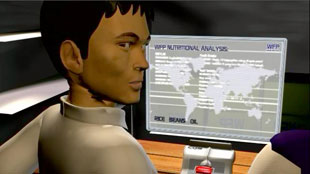 |
The World Food Programme has really capitalized on its first video game Food Force by creating versions of the game in several languages, most recently Polish, and now launching a blog featuring one of the in-game characters “Joe”.
The blog looks like it is going to be a curious mixture of real world examinations of the life of a humanitarian aid worker on the ground (like this entry about refugees in Mauritania) and promotional and educational efforts (like this entry on a Cirque du Soleil performance in Rome.)
With unfortunate hyperbole, the UN press release expresses the hope of the blog:
‘Joe’s blog,’ named after one of Food Force’s main characters, is a place where the millions of youngsters who played the video game and visited the site can form a global community focusing on hunger and other social issues. It lets them send questions to WFP aid workers who post stories about their experiences and the reality of delivering life-saving food to those in need.
 |
Whether or not the “millions of youngsters” who downloaded the game will translate into a global community to combat hunger is another story. Blogs are great, but they don’t form communities, not on their own anyway. More power to them, anyway.
“Blogs are great, but they don’t form communities…”
Rik — This is a fundamentally important point, and I’m so glad you’ve made it.
Even as a blogger myself, I realize that actions taken in concert with others, either in rallies, activist chapters or lobby visits to the Hill are what translate into sustained change. Group, in-person action builds a share sense of purpose, reinforces common values and inspires others to act responsibily as “individuals within community.”
Sadly, too many organizations (many of which I am a member) have decided that numbers alone are supposed to represent committment to a cause. To that end, they have replaced real grassroots training (yes, hard work with little immediate pay-off!) with “astroturf” activism programs.
They (and others) call on us to express our shared values, shared committment to global engagement, shared committment, but don’t offer us avenues to do so. Honestly, can anyone tell me what aspect of individuals pointing-and-clicking action alerts can be considered “shared”? 🙂
Good points.
I would say that the “shared” aspect of online activity relates mostly to coordinated online action, like wikipedia, slashdot, open source software development. Putting out problems or questions and enabling lots and lots of people to solve them collectively is a “shared” activity at its best.
Any thoughts on how you would see that kind of shared online activity translate in a humanitarian context, such as WFP’s mission to feed the hungry?
I see Joe’s blog as a way of giving people who might otherwise visit the Food Force site, download the game and never come back, a reason to return and hopefully learn more about hunger and find motivation to do something about it.
Of course this doesn’t equate to a full-scale online community, but it’s certainly an awareness-raising tool, which is the first step in the process.
Humanitarian aid workers are in a unique position with access to ICTs while also being grounded in real work helping people in dire straits around the world. I could see real value in creating an aggregating tool like Global Voices Online (http://www.globalvoicesonline.org/) which pulls together the most insightful blog content from around the world and presents it in an easy to skim format.
What if such a group blog were created to highlight the work and challenges of humanitarian aid workers around the world? It would help them to get a bigger audience for the work that they are doing, share insights and stories with colleagues beyond their immediate sphere, and perhaps impact the larger policy debate on the relevance of this work at the UN and Washington and elsewhere.
There are probably privacy and confidentiality requirements, but than again you also have US soldiers in Iraq blogging. So they can’t be more onerous than restrictions from the US military.